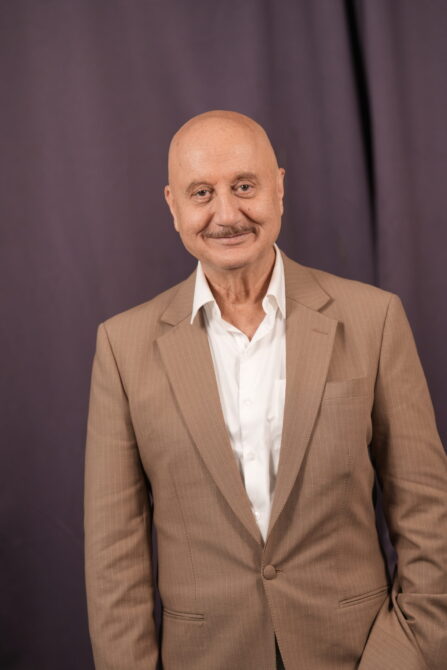“Over generations, kindness has changed”, Anupam Kher on the changing nature of the industry on In The Ring with Filmfare
Catch Unfiltered Anupam Kher in his most honest, heartfelt avatar on In the Ring with Filmfare, now streaming on Filmfare’s YouTube Channel
July 19, 2025: From walking into Mumbai with just ₹37 in his pocket to building a filmography that spans over 540 films across languages and continents, Anupam Kher’s journey has been anything but ordinary. In the latest episode of In The Ring with Filmfare, the veteran actor sits down with Jitesh Pillaai for an unfiltered, honest conversation—one that dives deep into rejection, resilience, and the quiet power of self-belief.

Known for his unforgettable performances, Anupam Kher is one of Indian cinema’s most enduring and respected actors. From powerful roles in Saaransh, Dilwale Dulhania Le Jayenge, and A Wednesday, as well as acclaimed international titles like Silver Linings Playbook and New Amsterdam, he has consistently demonstrated incredible range and depth as a performer. He is also a writer, theatre artist, and motivational speaker who has consistently connected with audiences beyond the screen. Despite the fame, he’s remained grounded, staying true to a journey marked by rejection, self-doubt, and the steady building of a legacy that continues to evolve with every passing year.
On tracing his path from a small town to becoming a pillar of Indian cinema, Kher shares what he’d say to his younger self, “My 20-year-old younger self is someone I would tell to dream. Continue to dream and don’t worry about obstacles or failures because that’s what my father taught me: failure is an event, never a person. And I would also tell him, don’t worry if you go bad, because that will become your trademark, and then so many people will want to be like you. I’m genuinely very happy with how my life has turned out. I have no regrets. It’s a beautiful life. God has been very kind to me. I come from a small town, and my father used to earn ₹190 per month. I came to the city on the 3rd of June 1981, with just ₹37 in my pocket. Now, 40 years later, I have having done 546 films. In this city, millions and millions of people come to make it, but only 0.01% do. I’m one of those, so I have no complaints.”
Looking back at the early rejections that shaped his grit, Kher recalls the moments that cut deep, and what they taught him about empathy, “There have been a lot of kind advice and things that happened in my life. But I want to highlight the unkind things, too. I saw so many big actors treat their boys so badly. And so many people said to me, ‘What will you do in your life? You don’t have hair, you’re not that good looking.’ That’s when I really started struggling to fit in and build a career. I remember being in Natraj Studio, and someone told me, ‘You cannot be an actor.’ So I believe, no matter what, one must always choose to be kind.”
Speaking on how the world has changed, he reflects on a shift in values in today’s fast-paced world, “Over generations, kindness has changed. People are no longer kind. People are no longer compassionate. People have become very competitive. And I’m not saying that’s a bad thing, it’s just the truth. The mobile phone has taken over our lives. I’ve seen doctors scrolling on their phones right before a shot, saying, ‘Okay, ready?’ And I think, where’s the relationship? Where’s the bonding? It’s not there anymore.”
Recounting a career-defining moment, Kher remembers how he fought to reclaim what was his, “I was finalized for Saaransh and rehearsed for six months. I used to go to Shivaji Park, observe people’s movements, walk with a stick, really get into the character. One day, I found out I had been replaced by Sanjeev Kumar. I was shocked. I immediately went to Mahesh Bhatt’s house and fought for my role. I told him, ‘He can’t do the role—I was finalized six months ago.’ I fought for it and got the role back. That day, I learned how to fight for myself. Because when you manipulate friendship, that’s not real friendship. With Mahesh Bhatt, I’ve always shared mentorship and genuine camaraderie.”
Speaking candidly about his battle with depression, Kher shares the life-altering advice that helped him shift his mindset, “I had reached a point where I just couldn’t sleep for years. Even sleeping pills didn’t work. I once told my eye doctor there was pressure in my eyes and asked for drops. He said, ‘Mr. Kher, you don’t need eye drops, you need to talk to someone.’ I was diagnosed with depression and given medication, but I kept going back just to talk. One day, he told me something that stayed with me: ‘Stop making stories. The problem is the stories you tell yourself. Maybe the other person is happy—you’re just creating a false narrative in your head.’ That one line changed a lot for me. Even today, I remind myself—stop making stories.”

